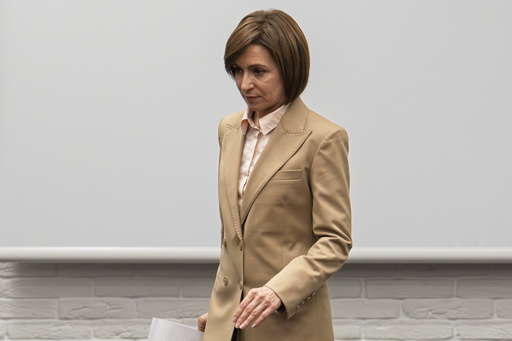CHISINAU, Moldova — As results from a recent referendum suggested a narrow lead for those advocating for Moldova’s European Union membership, the pro-Western president accused “criminal organizations” of attempting to disrupt the electoral process.
With nearly 99% of the votes counted from the referendum conducted on Sunday, which asked citizens to vote on enshrining the EU membership pathway in the national constitution, the “Yes” vote achieved 50.18% from approximately 1.4 million ballots cast, according to the Central Electoral Commission’s data.
Additionally, over 200,000 votes from a significant diaspora population appeared to lean towards the EU integration side and were counted overnight. If the referendum does not pass, it would pose a significant setback for the pro-Western government that fully endorsed the pro-EU campaign.
“Criminal groups, in collaboration with foreign entities that oppose our national interests, have launched an attack against our nation using tens of millions of euros for disinformation and manipulation, relying on the most disgraceful tactics to keep our citizens confined in mistrust and instability,” President Maia Sandu stated as about 90% of the votes had been tallied.
Sandu claimed that they had “clear evidence” of attempts by these criminal organizations to manipulate the election through a “fraud of unprecedented scale” aimed at buying 300,000 votes, suggesting that their goal was to undermine a democratic process.
The referendum took place amid persistent claims from Moldovan officials that Moscow has escalated a “hybrid war” strategy to destabilize Moldova, potentially hindering its European aspirations. These claims involve accusations of funding for pro-Moscow opposition groups, spreading misinformation, meddling in local elections, and facilitating a major vote-buying operation.
During the same time, the first round of the presidential election was held; Sandu emerged with 42% of the vote from a field of 11 candidates but did not achieve a majority. She will compete against Alexandr Stoianoglo, a former prosecutor general with pro-Russian stances, who garnered around 26% of the votes, in a runoff on November 3.
According to the Central Electoral Commission, over 1.5 million voters had participated by the end of polling, constituting roughly 51% of eligible voters.
Cristian Cantir, an associate professor of international relations at Oakland University, indicated that the polls may have “overestimated the pro-EU sentiment” in Moldova, suggesting that the support found within the county could not have led the referendum to succeed without the votes from those abroad.
“This scenario is particularly troubling as it could reinforce narratives from the Kremlin and pro-Russian factions,” he commented.
U.S. national security spokesperson John Kirby also reiterated concerns regarding Russian interference, asserting that Russia is actively working to destabilize Moldova’s elections and thwart its quest for European integration. Moscow has consistently refuted allegations of meddling in Moldova’s affairs.
In early October, Moldovan authorities unveiled a substantial vote-buying operation allegedly orchestrated by Ilan Shor, a pro-Russian oligarch residing in exile in Russia, who reportedly funneled 15 million euros (approximately $16.2 million) to bribe 130,000 individuals in an effort to sabotage the two votes.
Last year, Shor was convicted in absentia on charges of fraud and money laundering, receiving a 15-year prison sentence linked to the $1 billion that disappeared from Moldovan banks back in 2014. He has denied these allegations, claiming that the payments were legitimate and pointing to his right to free speech. Notably, his populist, pro-Russian Shor Party was declared unconstitutional and disbanded last year.
Earlier this week, Moldovan authorities foiled another conspiracy where over 100 young Moldovans were reportedly trained in Moscow by private military entities to incite civil unrest around the two votes. Reports indicated that some individuals received more advanced training at guerrilla camps in Serbia and Bosnia, resulting in the detention of four people for a month by police.
Since 2021, Moldova has been governed by a pro-Western administration, following Sandu’s presidential victory. A parliamentary election is expected next year.
Moldova, a former Soviet republic with a population estimated at 2.5 million, submitted its application for EU membership after Russia’s full-scale invasion of Ukraine on February 24, 2022 and was granted candidate status that summer, alongside Ukraine. In June, Brussels initiated membership negotiations.


